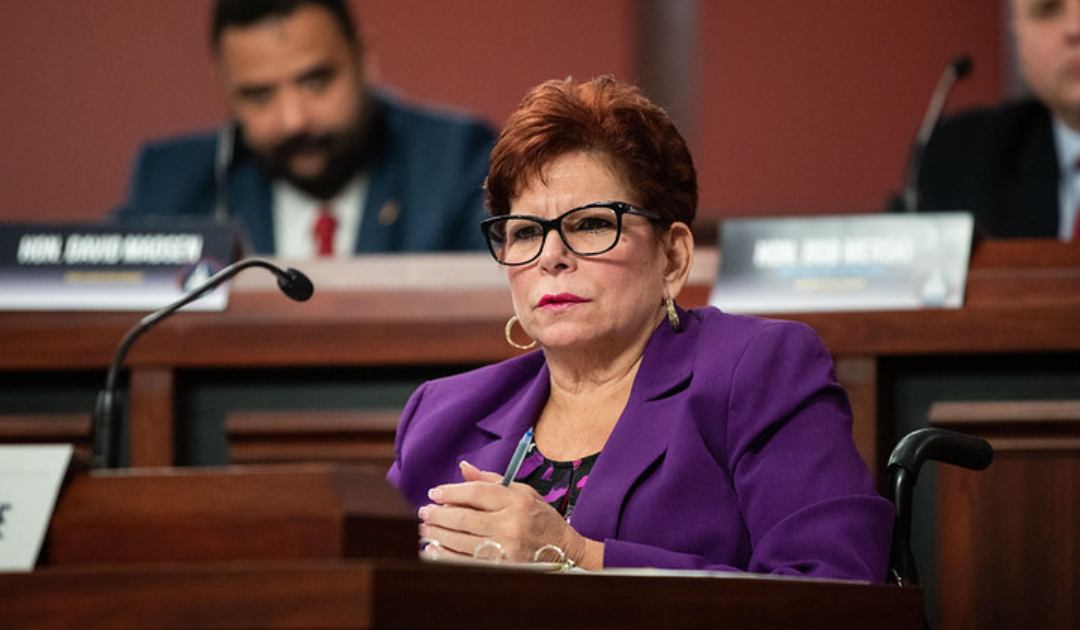
by Jessica Marpe | March 21, 2023 | News Releases
Harrisburg, PA- March 20, 2023 – State Senator Katie Muth (D-Chester/Montgomery/Berks), Chair of the Senate Democratic Policy Committee, and House Democratic Policy Committee Chair Ryan Bizzarro (D-Erie) joined join Sen. Christine Tartaglione (D-Philadelphia) and Rep. Patrick Harkins (D-Erie) to co-host a joint public hearing on legislation that would extend Occupational Safety and Health Administration (OSHA) protections to public employees in Pennsylvania.
The hearing, held earlier today at the State Capitol in Harrisburg, featured two panels of testimony on both sides of the issue of extending OSHA protections to public employees in Pennsylvania.
“All Pennsylvanians deserve a safe workplace – and we need to make sure that we extend the critical workplace safety protections under OSHA to public employees across the Commonwealth,” Muth said. “There are so many public employees that put their lives on the line each and every day to protect our communities, to improve our roads, and to respond to emergencies – these individuals deserve better and they deserve workplace safety protections.”
OSHA was created in 1970 by the United States Congress to assure safe conditions for working men and women. OSHA covers most private sector employers and workers in all 50 states either directly through Federal OSHA or through an OSHA-approved state plan. Workplace health and safety protections under OSHA do not automatically cover public sector employees in state and municipal government.
“As we heard today, a workers right to know they are safe and protected at their jobs shouldn’t depend on who they work for,” said Senator Tartaglione. “We need to pass Senate Bill 93 to ensure Pennsylvanians all have OSHA protections regardless of their employer.”
States have to choose to extend these protections — and over half have already done so through OSHA-approved “state plans” that allow states to operate their own workplace health and safety programs covering public and/or private sector workers – Pennsylvania is not one of those states. Senator Tartaglione’s Senate Bill 93 would establish the Pennsylvania Occupational Safety and Health Review Board within the Department of Labor and Industry and extend OSHA safety rules to public employers.
“We have heard the outcry that municipalities can’t afford this, and my response has always been, what price are we placing on human life?” Rep. Pat Harkins said. “It’s truly a shame if we can’t afford to protect our workers. Where is the justice and where is the opportunity for justice? That’s why I’m pushing House Bill 299.”
Rep. Harkins has introduced House Bill 299 – the Jake Schwab Worker Safety Bill – which would also extend OSHA protections to public sector employees in Pennsylvania. Rep. Harkins’ bill was named in memory of Erie resident Jake Schwab who was fatally injured at work in 2014 working as a mechanic with the Erie Metropolitan Transit Authority, a public sector employer exempt from OSHA regulations.
“Today’s hearing shined a light on the need to ensure safety conditions for almost 600,000 public sector workers in Pennsylvania,” House Majority Policy Committee chairman Ryan Bizzarro said. “Public sector workers cannot and should not continue to be treated as second-class employees. The time has come to extend OSHA protections for all public sector workers.”
Participants in the hearing included Keith Wentz, Risk Management Director, County Commissioners Association of Pennsylvania; Angela Ferritto, President, Pennsylvania AFL-CIO; Arthur Steinberg, President, Pennsylvania American Federation of Teachers; and J. David Henderson, Executive Director, AFSCME Council 13.
“Hundreds of thousands of Pennsylvania’s public sector workers don’t have the same safety protections that their private sector counterparts do for one simple reason: Federal OSHA standards don’t apply to the public sector. But in addition to not having the protection of OSHA safety standards and regular inspections, these workers don’t have the whistleblower protections that they need to protect them from retaliation if they report unsafe working conditions,” Senator Lindsey Williams (D-Allegheny) added. “That means an employee can be fired, have their hours reduced, or suffer other adverse consequences simply for using the only resource they have to stay safe on the job—their voice. We must do more to protect Pennsylvania’s public sector workers. That means extending OSHA standards to public sector workers and strengthening whistleblower protections for ALL employees, public and private sector.”
All submitted testimony from the policy hearing and the full video is available at SenatorMuth.com/Policy
###
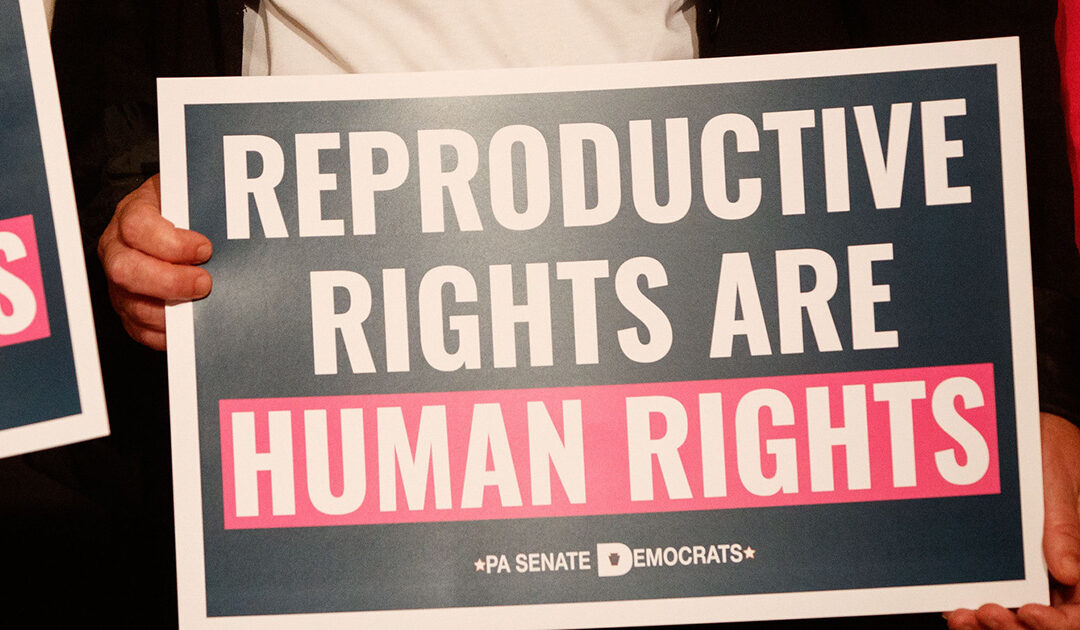
por Christin Brown | 27 de junio de 2022 | reportaje, Comunicados de prensa
HARRISBURG, 27 de junio de 2022 - Siete miembros del Caucus Demócrata del Senado de Pensilvania hicieron circular un memorándum el viernes por la tarde para tomar medidas para codificar en la ley estatal el derecho personal a tomar decisiones sobre la salud y la reproducción, incluido el acceso a abortos seguros y legales.
El memorando de copatrocinio fue distribuido por los senadores estatales Katie Muth (D- Montgomery / Chester / Berks), Amanda Cappelletti (D-Montgomery / Delaware), Lindsey Williams (D-Allegheny), Maria Collett (D-Bucks / Montgomery), Judy Schwank (D-Berks), Christine Tartaglione (D-Filadelfia), y Carolyn Comitta (D-Chester).
"La decisión del Tribunal Supremo dictada el viernes no se hizo en interés del pueblo y muestra que el más alto tribunal de nuestra nación tiene una mayoría que está siendo dirigida por intereses especiales de la derecha dañina", dijo Muth. "Si no podemos confiar en que el Tribunal proteja los derechos de los ciudadanos de Pensilvania, entonces nos corresponde a nosotros en la legislatura estatal defender nuestros derechos a tomar decisiones sobre nuestros propios cuerpos. No podemos y nunca retrocederemos en la lucha para proteger nuestros derechos, nuestros cuerpos y nuestro derecho a elegir."
La legislación llega tras la devastadora sentencia dictada el viernes por un Tribunal Supremo partidista que anuló la sentencia Roe contra Wade de 1973 y elimina el derecho constitucional al aborto después de casi 50 años.
"Codificar Roe contribuirá en gran medida a proteger el derecho a determinar nuestra propia autonomía corporal aquí en la Commonwealth. Actualmente, el derecho a tomar decisiones sobre nuestro propio cuerpo está amenazado porque los extremistas se niegan a aceptar la realidad de que el aborto es un procedimiento sanitario necesario y vital", dijo Cappelletti. "Debemos hacer todo lo posible para proteger e incluso ampliar el acceso, y esta legislación es el primer paso para hacerlo".
En 1973, el Tribunal Supremo de Estados Unidos dictaminó en el caso Roe contra Wade que dejar el derecho al aborto en manos de cada estado constituía una violación del derecho a la intimidad y a la igualdad de protección ante la ley. Esta sentencia había proporcionado a las mujeres estadounidenses las libertades reproductivas y las opciones de salud personal que merecen como ciudadanas iguales.
"La sentencia del Tribunal Supremo de la semana pasada eliminó el derecho federal de millones de estadounidenses a buscar atención sanitaria reproductiva que salve vidas. El aborto sólo es legal en Pensilvania en este momento porque los proyectos de ley contra el derecho a decidir presentados por los republicanos en la legislatura han sido vetados por el gobernador. Ha llegado el momento de codificar Roe en la legislación estatal para garantizar que la atención sanitaria reproductiva siga siendo segura y accesible para las generaciones futuras", añadió Williams. "Decidir si se quiere formar una familia, cuándo y con quién es un derecho humano. Confío en que la gente tome las mejores decisiones sobre su vida, su familia y su atención sanitaria. Esta legislación trata de nuestro derecho a la intimidad y nuestro derecho a la autonomía corporal, y estoy orgullosa de apoyarla."
En la opinión disidente presentada el viernes, el juez del Tribunal Supremo Stephen Breyer escribió que "retirar a una mujer el derecho a elegir si desea continuar con un embarazo no significa que no se esté eligiendo. Significa que una mayoría del Tribunal de hoy ha arrancado esta elección a las mujeres y se la ha dado a los Estados. Permitir que un Estado ejerza el control sobre una de "las elecciones más íntimas y personales" que puede hacer una mujer no es sólo afectar al curso de su vida, por monumentales que puedan ser esos efectos".
"Después de casi 50 años de precedentes legales, estamos viendo nada menos que un retroceso de nuestros derechos fundamentales a la autonomía corporal. Esta sentencia podría ser devastadora para los ciudadanos de Pensilvania, pero no tiene por qué serlo", añadió Collett. "Nuestra legislatura debe codificar Roe contra Wade y garantizar una atención reproductiva segura, legal y accesible para todos, independientemente de su nivel de ingresos u otras barreras sociales."
Según un sondeo realizado en abril de 2022 por el Franklin & Marshall College, que viene realizando encuestas periódicas sobre esta cuestión desde 2009, sólo el 16% de los habitantes de Pensilvania cree que el aborto debería ser ilegal en todas las circunstancias.
"Sin Roe, las legislaturas estatales de todo el país se alinearán para restringir, prohibir o proteger el acceso al aborto. Dado que sólo el 30% de los ciudadanos de Pensilvania están de acuerdo con la anulación de Roe, creo que esta legislación hará lo que nuestros electores esperan que hagamos: proteger el acceso al aborto", dijo Schwank. "No podemos permitir que las decisiones personales sobre el cuidado de la salud de la gente de esta Commonwealth sean tomadas por una minoría ruidosa".
Todos los senadores coinciden en que corresponde al poder legislativo tomar medidas para proteger la libertad de elección de las mujeres.
"Aunque el aborto sigue siendo seguro y legal en Pensilvania, debemos tomar medidas para que siga siéndolo. Al revocar el caso Roe contra Wade, el Tribunal Supremo demostró lo frágiles que son las protecciones para la salud de la mujer, los derechos de la mujer y la elección de la mujer", dijo Comitta. "Codificar estas protecciones en la ley es una cuestión de representar a la mayoría de los votantes de Pensilvania que creen que el aborto debe ser legal, defender a todas las mujeres y decir no a una agenda extremista de embarazos impuestos por el gobierno".
Los senadores indicaron que se está redactando un borrador para codificar las protecciones de la sentencia Roe contra Wade de 1973 en la legislación de Pensilvania y que se presentará en breve.
"Acabamos de presenciar una derogación sin precedentes de los derechos de las mujeres en Estados Unidos por parte de jueces activistas que actúan en contra de los intereses de la mayoría de los estadounidenses. La legislatura de Pensilvania tiene que actuar ahora para garantizar que protegemos los derechos de las mujeres aquí en Pensilvania", dijo Tartaglione. "Esta legislación garantizará que las mujeres conserven el derecho a abortos seguros y protege a las mujeres de que el gobierno interfiera en el proceso privado de toma de decisiones entre ella y su equipo sanitario".
Haga clic aquí para leer el memorándum de copatrocinio que se distribuyó el viernes.
###
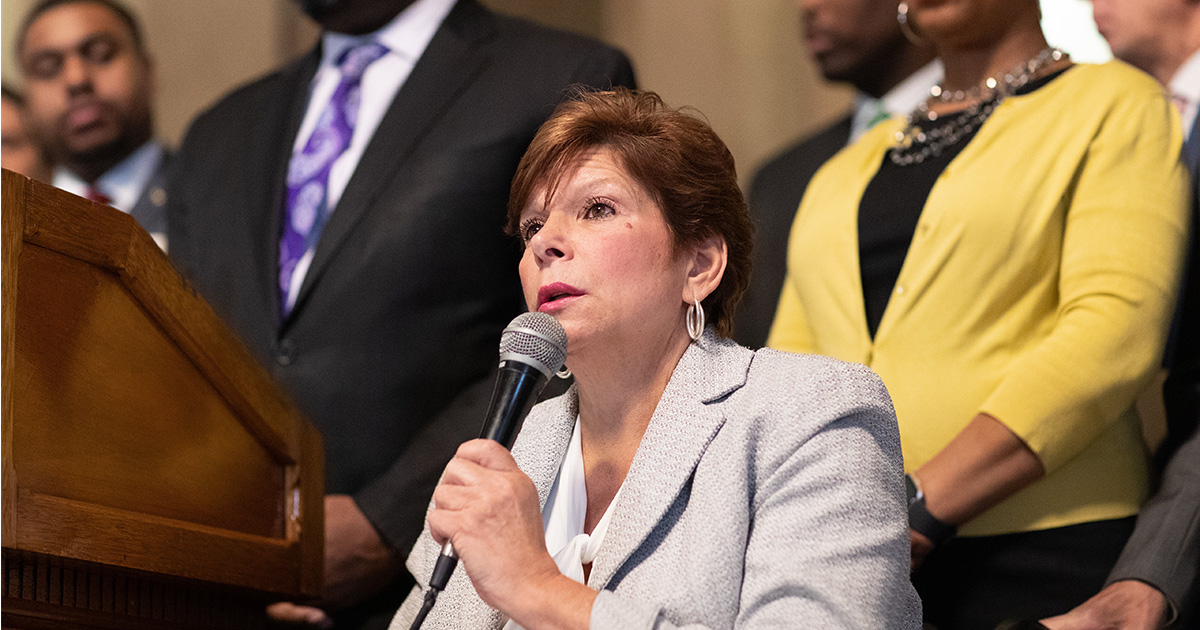
by Christin Brown | June 24, 2022 | feature, News Releases
Harrisburg − June 24, 2022 − Co-chairs of the Pennsylvania Women’s Health Caucus (WHC) and members of the Pennsylvania State Senate Democratic Caucus criticized today’s ruling by the U.S. Supreme Court on Dobbs v. Jackson Women’s Health Organization. The ruling by the court not only upheld a Mississippi law banning abortion after 15 weeks but also goes further and overturns both Roe v. Wade and Planned Parenthood v. Casey, opening the door for states to outright ban or severely restrict abortion.
The ruling eliminates the constitutional right to an abortion recognized by the 1973 Roe v. Wade decision. Since a draft of the opinion written by Justice Samuel Alito was leaked and its authenticity subsequently confirmed by the court, advocacy groups, elected officials, and stakeholders have been issuing dire warnings about what such a radical decision would mean and the detrimental impact it would have on the health of millions of Americans.
After today’s decision, the 13 states that passed trigger laws now have bans or severe restrictions already enshrined into law, leaving millions of Americans without access to abortion immediately. Arkansas, Idaho and Oklahoma law now criminalizes abortion with penalties ranging from 5 to ten years in prison.
“The Supreme Court’s decision is absolutely gutting and a severe blow to women across the country,” said WHC co-chair Sen. Judy Schwank (D-11th). “We have a maternal mortality crisis in the commonwealth and the U.S. that will only be furthered by this reckless and ideologically driven decision. Our goal now needs to be preserving the access Pennsylvanians currently have to reproductive health care that will no doubt be subject to renewed attacks in the state legislature.”
“The overturning of Roe v. Wade is a devastating decision that will impact millions of women and child-bearing individuals across the country,” said WHC co-chair Sen. Amanda Cappelletti. “Women and child-bearing individuals are not second-class citizens. Bodily autonomy is a human right and abortion is still legal in Pennsylvania. I will do everything in my power to ensure it stays that way here in our commonwealth.”
“Despite today’s decision, here in Pennsylvania, we have to ensure that we maintain the right to legal and safe abortion access and that we continue fighting for women and families across the state for this option,” said WHC co-chair Rep. Morgan Cephas (D-192nd). “Limiting access to abortion healthcare will only exacerbate the maternal health care deserts that we’ve seen across our state and worsen the burden of the decisions that women and families need to make during this challenging time in their lives.”
“This decision is not only an extreme disappointment, but it is completely out of step with what the majority of Americans support, including here in Pennsylvania,” said State Senate Democratic Leader Sen. Jay Costa (D-43rd). “When reproductive rights are threatened, women’s health care on all levels is at risk. Instead of restricting health care for women, Senate Democrats are committed to making the healthcare system work even better for women and their specific health needs. Instead of stripping women of their rights and opening the door for others to lose fundamental rights as well, Senate Democrats will use our positions to identify real health challenges and solutions for women in this Commonwealth. Proactive, unbiased, convenient, and supportive healthcare should easily be a reality for women, and we will continue to make it a priority.”
“It’s a very scary day for our country,” said Sen. Katie Muth (D-44th). “This decision shows that the highest court in the land now includes radical politics into their decision-making process. This is what happens when the bench is stacked by a President who was unfit to serve the public. Now, we must take our anger and turn it into action, and hold every elected official accountable because we will never back down in the fight to protect our rights, our bodies, and our right to choice.”
“While this decision was expected, it is no less devastating,” said Sen. Maria Collett (D-12th). “Without Roe, what happens in the Pennsylvania legislature is more important than ever, and members of the Republican majority have already moved unpopular bills that turn back the clock and effectively ban all abortion. We need to be expanding access to healthcare across our commonwealth, not eliminating it, and I will continue to fight to ensure women can control their own medical decisions.”
“Fundamentally, the SCOTUS’ decision to overturn Roe v. Wade is an attack on every person’s constitutional right to make decisions about their bodies and reproductive health,” said Sen. Tim Kearney (D-26th). “Research shows that limiting access to abortions will cause more harm, inequities, and possibly deaths—especially for the poor and communities vulnerable to health disparities or lack of adequate healthcare. Now Pennsylvania must take the necessary steps to protect abortion rights. The onus will fall on our Commonwealth, and voters this coming election to select candidates whose policy positions align with their own. We must do what we can to ensure that Pennsylvanians continue to have access to safe and legal abortions.”
“To say I am disappointed in this decision would be a tremendous understatement,” said Sen. Carolyn Comitta (D-19th). “This ruling from the Supreme Court is a blatant attack on the personal freedoms, reproductive rights, and access to healthcare of women across the nation. Abortion is healthcare. Decisions women make about their own bodies should only be between them and their doctors. Today’s ruling will stand as an organizing call to redouble our efforts to protect reproductive rights and access to vital women’s healthcare in Pennsylvania and across the U.S.”
“I am appalled and disappointed in the Supreme Court for overturning decades of precedent and nearly overnight rolling back generations of work that had been hard-fought and won,” said Sen. Christine Tartaglione (D-2nd). “Make no mistake, the Supreme Court today did not end abortions in the United States, they ended safe abortions in the United States. We must now continue the fight that so many have been fighting for years and elect pro-choice, pro-women candidates this fall. We must now act to ensure and enshrine in Pennsylvania law the right to access abortion care for all women.”
Collectively, the WHC co-chairs are now expressing the importance of organizing around abortion rights and moving to preserve the access to abortion that is currently available in Pennsylvania.
As of now, abortion remains safe and legal in Pennsylvania, however, Pennsylvania House and Senate Republicans have signaled they will move aggressively to ban or restrict abortion in the commonwealth.
They’re currently floating the possibility of moving a vaguely worded constitutional amendment stating that there is no constitutional right to an abortion in Pennsylvania through both chambers to circumvent a veto. The constitutional amendment could be placed on the ballot as early as the 2023 primary election.
###
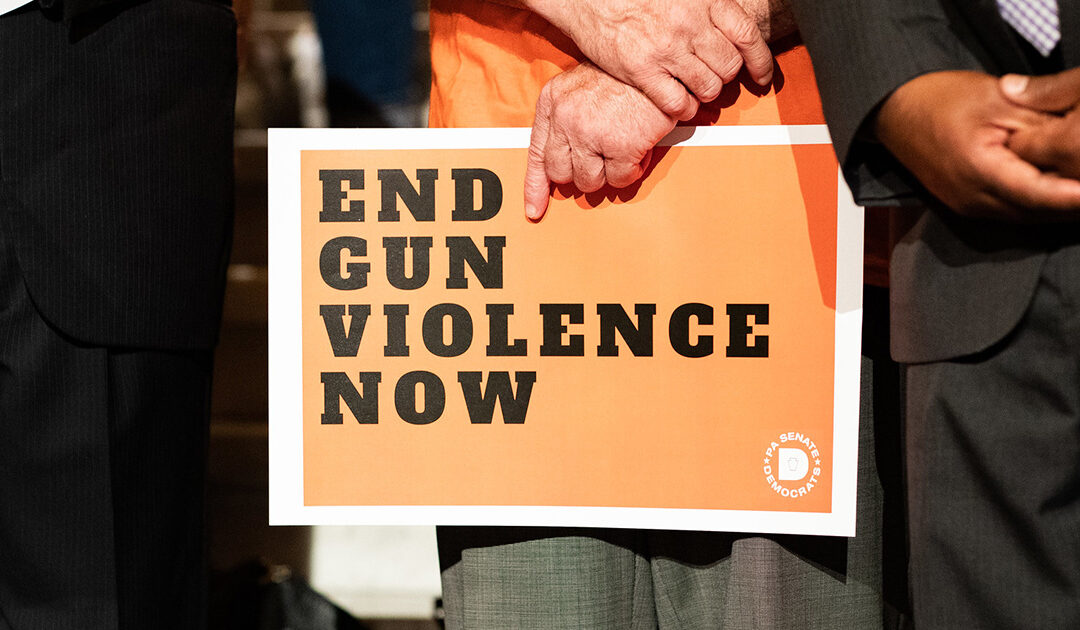
by Christin Brown | May 25, 2022 | News Releases
HARRISBURG - 25 de mayo de 2022 - Hoy, los demócratas del Senado de Pensilvania escribieron la siguiente carta a los líderes republicanos en respuesta a la violencia desenfrenada con armas de fuego y los tiroteos masivos que se han vuelto demasiado comunes en los Estados Unidos. Sólo este año, 215 tiroteos masivos han tenido lugar en el país, siendo el devastador tiroteo que ocurrió en la Escuela Primaria Robb en Uvalde, Texas, el 24 de mayo de 2022, el número 215.
En la carta, el grupo pide a la mayoría republicana que actúe sobre "una legislación y unos créditos razonables y responsables" que no infrinjan los derechos de la Segunda Enmienda pero que ayuden a mantener las armas alejadas de los malos actores y apoyen la prevención de la violencia armada. Los demócratas del Senado enumeran siete proyectos de ley que se han presentado para mitigar la violencia armada pero que se han quedado en comisión sin debatirse ni votarse. También destacan cómo los dólares del American Rescue Plan y el actual superávit presupuestario de Pensilvania pueden utilizarse para ayudar a las comunidades a prevenir la horrible violencia.
 Cargando...
Cargando...
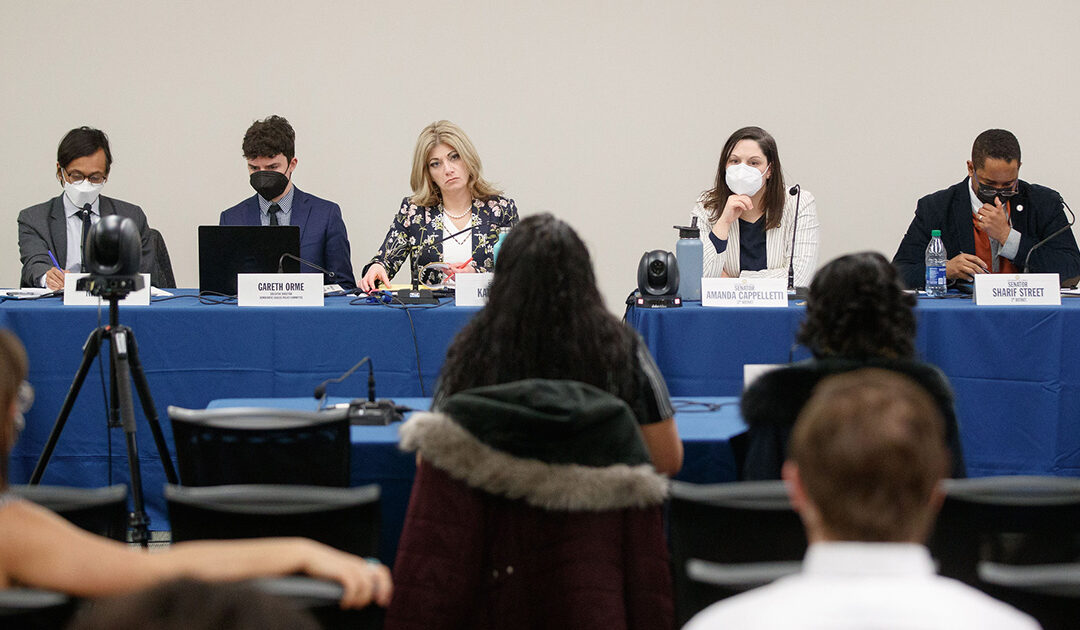
by Christin Brown | March 15, 2022 | News Releases
PHILADELPHIA, March 15, 2022 – State Senator Katie Muth (D- Berks/Chester/Montgomery), Chair of the Pennsylvania Senate Democratic Policy Committee, joined Senators Sharif Street, Nikil Saval, Amanda Cappelletti, Tina Tartaglione and Art Haywood to host a public hearing on housing scarcity and contemporary houselessness yesterday at Temple University.
“We need to tackle the issue of economic injustice – from raising wages to actual living wages and ensuring rent and housing prices are fair, transparent, and flexible according to each individual’s financial situation,” Muth said. “All levels of government need to implement policies that ensure public dollars are actually helping the public, not the wealthy, private real estate and private equity firms making billions off of taxpayer funded subsidies and evicting people who can’t afford to pay skyrocketing rent and housing rates. I hope our hearing and the impassioned testimony provided by actual Pennsylvanians living these challenges forces this conversation into the ongoing budget debate and into all 67 counties and local government priorities.”
The policy hearing featured three panels of participants who presented testimony and discussed personal stories about housing scarcity, houselessness, and the government’s responsibility to provide safe, affordable, and accessible housing in Pennsylvania.
“The recent tragic fire in Philadelphia’s Fairmount community that claimed the lives of 12, including 9 children, began with a failure of government. A family was forced to make the untenable choice of cramming eighteen individuals into a single unit because of a lack of resources. Housing is security and dignity. Years of divestment from every level of government have been an abdication of government’s duty to protect the communities they serve,” Street said. “The fundamental question for society and government is ‘how do we create accessible, safe and affordable housing for all?’ I look forward to joining my colleagues in creating policy to address the critical issue of housing scarcity.”
Testifiers at the hearing included Gail Loney, a North Central Philadelphia resident; Alisha Robinson, a Frankford resident; Kelvin Jeremiah, president and CEO, Philadelphia Housing Authority; Aaron Zappia, Senior Government Relations Manager, Housing Alliance of Pennsylvania; Andrew Frishkoff, Executive Director, Philadelphia Local Initiatives Support Corporation (LISC); and Stephanie Sena, Anti-Poverty Fellow & Housing Advocate, Villanova University Charles Widger School of Law.
“The housing crisis is not unsolvable—we need to act to ameliorate it at every chance we get,” Saval added. “That means raising wages, building equity into our systems, and preserving affordable housing by giving people what they need to repair and maintain and stay in their homes.”
All submitted testimony from the policy hearing and the full video is available at SenatorMuth.com/Policy.
# # #
Testimony
Panel 1: Lived Experience
- Gail Loney, North Central Philadelphia Resident
- Alisha Robinson, Frankford Resident
Panel 2: The Philadelphia Housing Authority
Panel 3: Policy Solutions
Additional Testimony
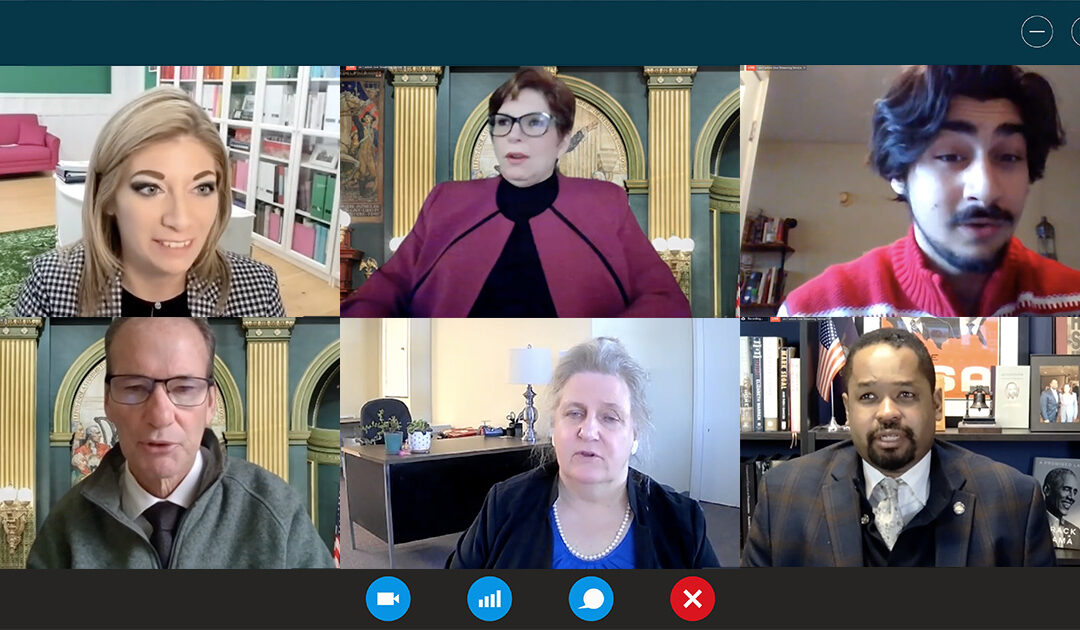
by Christin Brown | January 20, 2022 | feature, News Releases
HARRISBURG, January 20, 2022 – State Senator Katie Muth (D- Berks/Chester/Montgomery), Chair of the Pennsylvania Senate Democratic Policy Committee, today joined Senator John Kane (D-Delaware/Chester) and Senator Christine Tartaglione (D-Philadelphia) to host a virtual public hearing on the recovery challenges associated with substance use disorder.
“Today’s hearing was an opportunity to hear about what we are currently doing here in Pennsylvania and whether our current treatment system is providing positive outcomes for those in recovery from substance use disorder – and more importantly, if it is not working, how can we improve our systems and programs,” Muth said. “We need to ensure that the Commonwealth and our treatment and recovery programs are effective and are providing the best means for sustained, lifelong recovery.”
The virtual policy hearing featured three panels of expert testimony that focused on funding issues faced by the recovery community; the oversight of recovery houses in Pennsylvania; and the challenges with relapsing during recovery from substance use disorder.
“This issue is personal for me – I’ve been sober for almost 40 years. And I know firsthand how difficult recovery is,” Kane said. “Individuals in recovery are facing massive challenges. But as legislators, we have the chance to make that journey a little bit easier. I’m grateful to all the panelists who testified at today’s hearing, and I’m looking forward to getting to work to make sure safe and effective recovery options are available for everyone.”
It is estimated that Pennsylvania is set to receive up to $232 million of the $26 billion global opioid settlement in 2022 and up to $1 billion total over the next 18 years. Of that funding, nearly 70 percent of all funds will be distributed to county authorities to fund initiatives that include medication-assisted treatment, naloxone distribution and services for pregnant and parenting persons suffering from opioid use disorder.
“Having been in recovery for more than 18 years, I know first-hand how important it is to ensure people in recovery have the resources they need as soon as they reach out for help,” Tartaglione added. “The 2nd Senatorial District is no stranger to the challenges substance abuse brings. My community, Philadelphia, and Pennsylvania as a whole need to know that there are elected officials that are dedicated to helping end substance abuse and to expanding access to treatment. The hearing today has helped to open people’s eyes to how crucial timely treatment is.”
Testifiers at today’s hearing included Jennifer Smith, Secretary, PA Department of Drug and Alcohol Programs (DDAP); Bill Stauffer, Executive Director, Pennsylvania Recovery Organizations Alliance (PRO-A); Deb Beck, President, (Drug and Alcohol Service Providers Organization of PA (DASPOP); Jessica Molavi, Clinical Manager of Specialty Programs at Mirmont Treatment Center; and Adam Al-Asad and Sarah Laurel from Savage Sisters Recovery.
All submitted testimony from today’s hearing and the full video is available at SenatorMuth.com/Policy
# # #
Testimony
Panel 1: Recovery Funding
Panel 2: Oversight of Recovery Houses
Panel 3: Chronic Relapsing
Additional Written Testimony
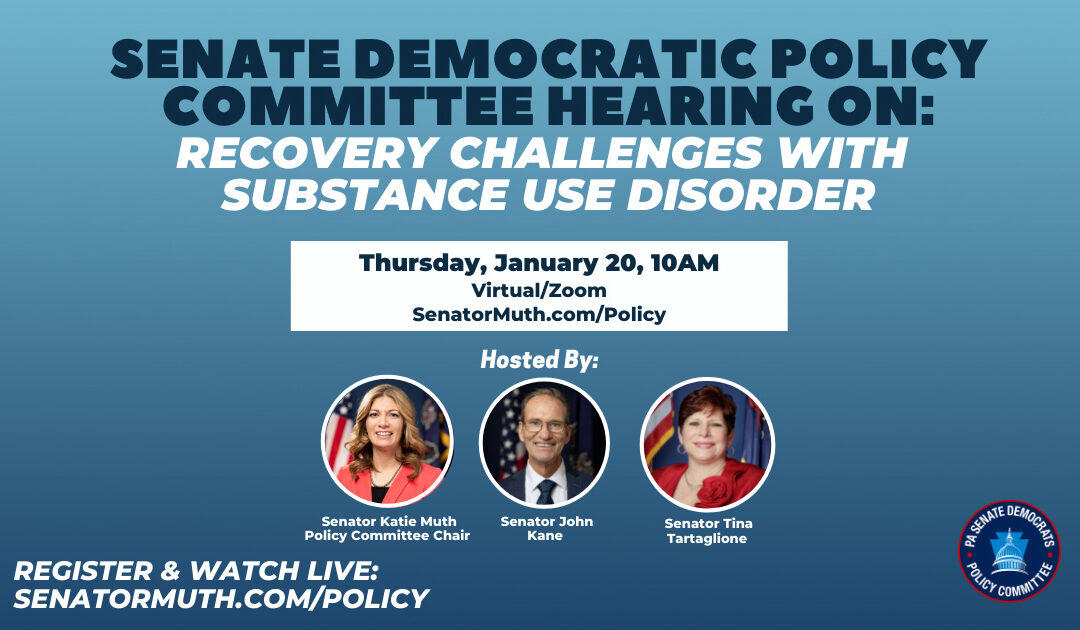
by Christin Brown | January 14, 2022 | Advisory
ROYERSFORD, January 14, 2022 – State Senator Katie Muth, chair of the Pennsylvania Senate Democratic Policy Committee, will join Senators John Kane and Christine Tartaglione to host a virtual public hearing next Thursday at 10 a.m. to discuss recovery challenges associated with substance use disorder.
The hearing will be held Thursday, January 20 at 10 a.m. on Zoom. Interested participants can register in advance by clicking here.
The policy hearing will feature testimony from three panels of experts that will discuss the challenges facing individuals in recovery from substance use disorder. The panels will include representatives from state agencies, treatment clinics, and local recovery houses who will each discuss their specific needs and challenges.
The hearing will also be livestreamed at SenatorMuth.com/Policy and on Senator Muth’s Facebook page.
Media participation is encouraged.
# # #
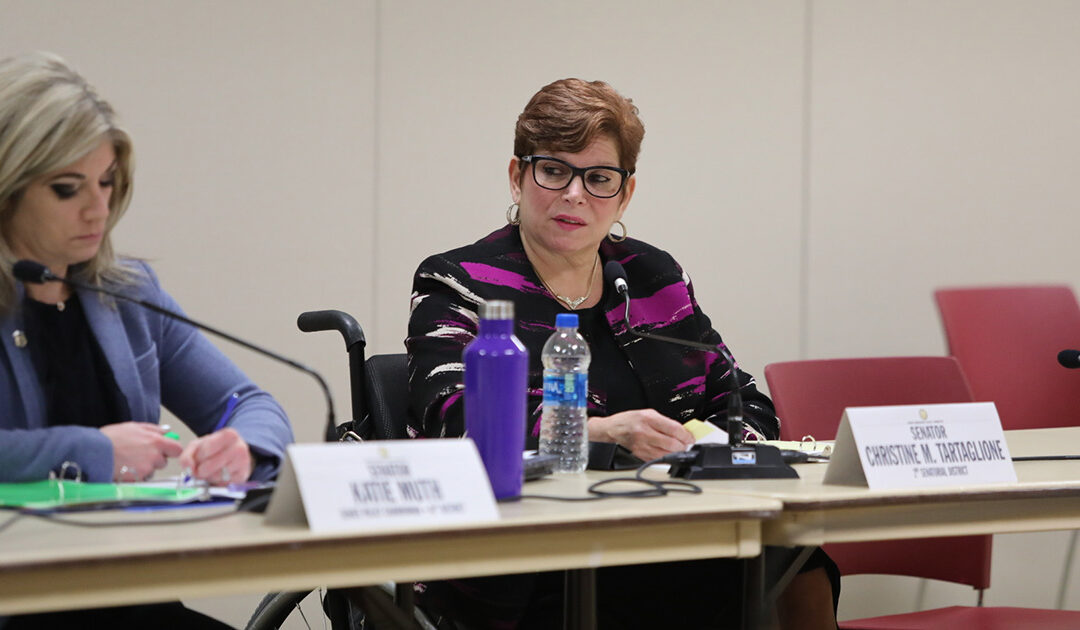
by Christin Brown | December 6, 2021 | News Releases
READING, December 6, 2021 – State Senator Katie Muth (D- Berks/Chester/Montgomery), Chair of the Pennsylvania Senate Democratic Policy Committee, today joined Senators Judy Schwank and Christine Tartaglione to host a public hearing on evaluating and improving drug treatment centers in Pennsylvania.
“The alarming rates of substance abuse and drug overdoses have been magnified throughout the COVID-19 pandemic. And when individuals and their families reach out for help and seek treatment, they do not have the resources and information available to make an informed choice about treatment facilities. Pennsylvania families deserve better,” Senator Muth said. “Today’s policy hearing allowed our Committee to hear from families who have tragically lost loved ones to addiction, and it also afforded us an opportunity to discuss possible legislative solutions and policy changes that can improve the evaluation process and treatment outcomes of Pennsylvania’s drug treatment centers. Patient outcome survey data should be guiding treatment plans, not insurance companies that often deny coverage for the care required for successful recovery.”
Pennsylvania has one of the highest rates of drug overdose in the nation and drug overdose deaths have increased in 46 of 67 counties in Pennsylvania throughout the COVID-19 pandemic. The Center for Disease Control’s National Center for Health Statistics indicated that there were over 100,000 drug overdose deaths in the United States during the 12-month period ending in April 2021, an increase of 28.5% from prior year.
“We must rethink our approach to adequately address the ongoing opioid epidemic, and one way to do that is to look at drug treatment centers. Individuals taking the crucial step of seeking treatment for addiction need to be given access to all the information they need to make the right decision for their own particular circumstances,” Schwank said. “This hearing provided us an opportunity to learn directly from individuals impacted by addiction, treatment providers and state regulators. It will give us a chance to better understand what factors make drug treatment more effective.”
Senator Schwank has introduced two bills – Senate Bill 975 and Senate Bill 976 – to address issues with Pennsylvania’s drug treatment facilities and recovery homes. Senate Bill 975 would require the Pennsylvania Department of Drug and Alcohol Programs (DDAP) to distribute an annual survey to all substance use disorder treatment centers and recovery homes operating in PA, record, and publish online for public access the responses provided by those treatment centers and recovery homes. Senate Bill 976 would prohibit any treatment center in PA to refuse admittance to anyone reporting to a treatment facility requesting medical or psychological services addressing substance use disorder – even if an individual is under the influence of drugs or alcohol at the time they report. It would also prohibit any health insurance company operating in PA from refusing coverage for admittance and provision of medical and psychological services.
“Today was a crucial step in addressing the crisis that is addiction, and the failure of treatment that surrounds it,” Tartaglione said. “The shifting demographics of addiction and overdoses show us that there is no community in this commonwealth that has not been touched by its devastation, from Erie to Philly and Allentown to Pittsburgh, the PA Senate Democrats are dedicated to bettering and expanding addiction treatment services offered.”
The Senate Democratic Policy Committee heard from several panelists at Reading Area Community College that included representatives from the Opioid Crisis Action Network, the Self-Help Movement, the Caron Foundation, the Council on Chemical Abuse, and the Pennsylvania Department of Drug and Alcohol Programs.
All submitted testimony from today’s hearing and the full video is available at SenatorMuth.com/Policy
# # #
Testimony
Panel 1: Affected People
Panel 2: Care Providers
Panel 3: Policy Solutions
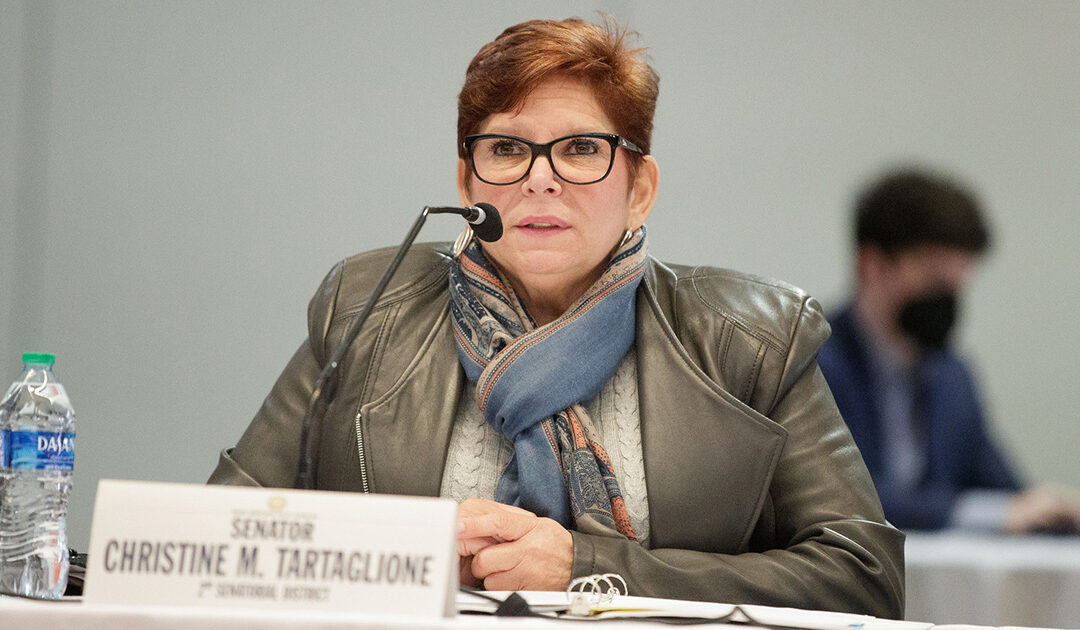
by Christin Brown | November 15, 2021 | feature, News Releases
PHILADELPHIA − November 15, 2021 – State Senator Katie Muth (D- Berks/Chester/Montgomery), Chair of the Pennsylvania Senate Democratic Policy Committee, today joined Senators Nikil Saval, John Kane, Christine Tartaglione and Lindsey Williams to host a public hearing to discuss issues related to worker misclassification in Pennsylvania.
“Worker misclassification isn’t just about building trades or construction, this issue impacts a whole segment of our workforce that deserves to be protected and paid fairly by their employers,” Senator Muth said. “I appreciate all of my colleagues and the panelists that participated today to shine a light on another instance of corporate greed – employers that are prioritizing profits over workers. It is time that we stand up for our workers in the state Senate.”
The Senate Democratic Policy Committee heard from several panelists at the Sheet Metal Workers Union Building in Philadelphia who all discussed the problems workers are face with when they are misclassified by their employers. The Keystone Research Center indicates that if Pennsylvania has rates of misclassification in the construction industry comparable to those in other states, it loses about $10 million in unemployment insurance taxes, at least $15 million in income tax revenues (and possibly three times as much), as much as $83 million in workers compensation premiums, and $200 million in federal income taxes.
“Worker misclassification is pervasive, and the resulting damages cut across all sectors of employment and all facets of our communities. Pennsylvania is a labor state with a long history of protecting workers’ rights, and it’s imperative that we continue this work in our swiftly changing economy,” Senator Saval said. “Just as companies that exploit workers can take these practices from state to state, Pennsylvania can create a model for worker protections that other states can adopt. How we approach this right now will impact the future of work.”
The hearing featured representation from various regional and statewide labor unions, including the Steamfitters Local 420, Painters DC21, Philadelphia Building and Construction Trades Council, PA AFL-CIO, and the Eastern Atlantic States Regional Council of Carpenters. Senator John Kane spent four decades as a union plumber prior to serving in the Senate and also served for twelve years as the Business Manager for one of the largest plumbers’ unions in the Commonwealth.
“My members earned good, family-sustaining wages and had good benefits. They had protections for workplace injuries and safe working conditions. When workers are misclassified as independent contractors, they lose these protections,” Senator Kane said. “I want to be clear – the misclassification of workers is a form of theft, plain and simple. Businesses cut costs to help their bottom line, and our workers pay the price. It’s long past time we took action to end worker misclassification, and I’m grateful to all our panelists for sharing their perspective in today’s hearing.”
The hearing also highlighted the worker misclassification issues experienced by workers in the app-based gig economy and discussed potential policy solutions to address the issue of worker misclassification. One bill discussed was Senate Bill 879 which was introduced by Senator Saval. This bill would hold general contractors responsible for paying any employees up and down a worksite, even if they are hired by a subcontractor.
“For too long unscrupulous employers have cut costs and corners by misclassifying Pennsylvania’s workers. The Pa Senate Democrats have and will continue to fight for the workers of this commonwealth,” Senator Tartaglione said. “Every worker deserves the protections that come with being an employee not a contractor. The cost of doing business cannot and should not be shifted onto a businesses’ employees.”
“Misclassification hurts workers, hurts employers who are doing the right thing by their workers, and it hurts taxpayers,” Senator Williams added.
All submitted testimony from today’s hearing and the full video is available at SenatorMuth.com/Policy
# # #
Testimony
Panel 1: Local Unions Roundtable
- Gary Masino, Sheetmetal Workers Local 19.
- Tom Redden, Steamfitters Local 420
- Tyler Honschke, Painters DC21
- Brian Eddis, Philadelphia Building Trades
Panel 2: Statewide Unions Roundtable
Panel 3: The Gig Economy
Panel 4: Policy Solutions
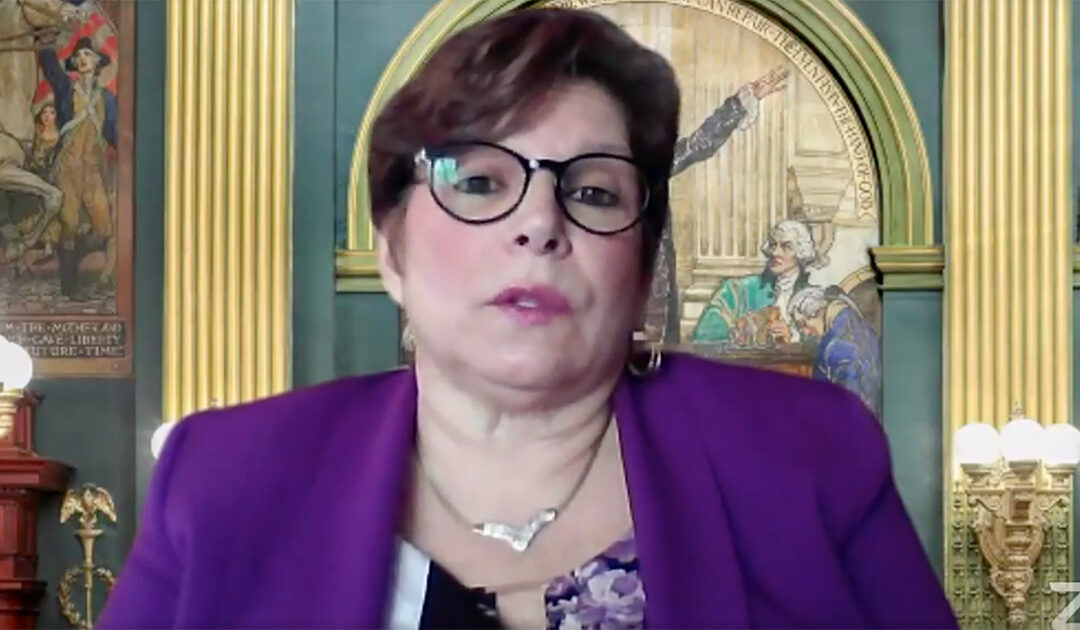
by Christin Brown | May 20, 2021 | News Releases
Harrisburg - 20 de mayo 2021 - A petición del senador Tina Tartaglione (D-Filadelfia), Presidente Demócrata de la Comisión del Senado de Trabajo e Industria, el Comité de Política Democrática de Pennsylvania celebró una audiencia pública virtual para discutir Proyecto de ley del Senado 310 y las protecciones de OSHA para los empleados públicos.
"Durante más de 50 años, los empleados del sector privado y los empleados federales de Estados Unidos se han beneficiado de las salvaguardias y la tranquilidad que ofrece la Ley de Seguridad y Salud en el Trabajo (OSHA). Es una parodia que los empleados públicos de Pensilvania no dispongan de las mismas protecciones", declaró el senador Tartaglione. "Todos los trabajadores tienen derecho a un lugar de trabajo seguro y saludable, y tienen derecho a saber que no sufrirán represalias cuando denuncien condiciones deficientes y peligrosas. Mi proyecto de ley 310 del Senado ampliaría las protecciones críticas de la OSHA a todos los trabajadores de Pensilvania."
El proyecto de ley 310 del Senado crearía la Junta de Revisión de Seguridad y Salud en el Trabajo de Pensilvania dentro del Departamento de Trabajo e Industria. En la actualidad, los trabajadores de los organismos públicos estatales y locales de Pensilvania no gozan de la protección de la Administración de Seguridad y Salud en el Trabajo (OSHA). Esta propuesta de ley ampliaría las normas de seguridad de la OSHA a los empleados públicos de la Commonwealth, todas las subdivisiones políticas legales, los colegios públicos, los sistemas de transporte público y las organizaciones sin ánimo de lucro de Pensilvania.
"Los trabajadores merecen saber que, cuando van a trabajar, su salud y su seguridad son una prioridad y no una ocurrencia tardía. Nadie debería tener que aceptar que las condiciones que ponen en peligro la vida son sólo parte de un trabajo, y los trabajadores de todas las profesiones y campos deberían contar con las protecciones de la OSHA. Me enorgullece apoyar el proyecto de ley 310 del Senado, y estoy muy agradecida al senador Tartaglione por defender este proyecto de ley en el Senado y hacer de las protecciones en el lugar de trabajo una prioridad en nuestro grupo", declaró la senadora Katie Muth (D- Berks/Chester/Montgomery), presidenta del Comité de Política Demócrata del Senado.
"Según el informe de AFL-CIO Death on the Job Report, 8,1 millones de trabajadores del sector público carecen de protección OSHA en todo el país. En 2019, su tasa de lesiones y enfermedades fue un 64% más alta que la de los empleados del sector privado", dijo Mike Maguire, Director de Asuntos Políticos y Legislativos del Consejo 13 de AFSCME. "Desde el establecimiento de OSHA en 1971, se han salvado más de 627,000 vidas de trabajadores. Extendamos esas protecciones a la mano de obra del sector público de nuestra Commonwealth".
En oposición al proyecto de ley 310 del Senado estaban Keith Wentz, Director de Gestión de Riesgos y Suscripción de la Asociación de Comisarios de Condados de Pensilvania (CCAP), y Stuart Knade, Esq., Director Jurídico de la Asociación de Consejos Escolares de Pensilvania.
Wentz señaló en su testimonio que él y su organización no creen que sean necesarias más protecciones de la OSHA para los empleados públicos porque ya existen juntas de seguridad voluntarias e inspecciones aleatorias de las instalaciones.
Knade dijo que la aplicación de las protecciones de OSHA para los empleados públicos en Pennsylvania sería difícil porque OSHA no fue escrito con ellos en mente, creando problemas con la aplicación. También dijo que la aplicación sería prohibitivo.
Tanto Wentz como Knade acordaron continuar las conversaciones con el senador Tartaglione sobre el proyecto de ley 310 del Senado y las protecciones de los empleados públicos.
"En realidad, los costes se reducen cuando el lugar de trabajo es más seguro", afirmó Rick Bloomingdale, Presidente de Pennsylvania AFL-CIO. Bloomingdale dijo en su testimonio que los mismos argumentos que Wentz y Knade esgrimieron hoy se utilizaron en la década de 1970, cuando se promulgó por primera vez la OSHA. Sin embargo, a lo largo de los años, OSHA ha demostrado ser un atractivo para empleados y empresarios del sector privado.
Bloomingdale afirmó que, gracias a la normativa OSHA en los centros de trabajo del sector privado, hay menos rotación de personal, más moral y menos incidentes que provoquen lesiones y necesidad de indemnizaciones en el lugar de trabajo.
"Según el informe Annual Death on the Jobs de la National AFL-CIO, en 2016, los empleadores estatales y locales del sector público reportaron una tasa de lesiones de 4,7 por cada 100 trabajadores, que es significativamente más alta que la tasa reportada de 2,9 por cada 100 entre los trabajadores del sector privado", dijo Bloomingdale.
Jeff Ney, tesorero de la Pennsylvania State Education Association (PSEA), explicó en su testimonio que los profesores también están excluidos de las protecciones de la OSHA.
"Como yo, muchos empleados públicos se sorprenden al saber que estas protecciones básicas no se aplican a ellos o a su lugar de trabajo", dijo Ney. "Las protecciones de sentido común contenidas en el SB 310 también garantizarán que nuestros estudiantes tengan un entorno educativo seguro y saludable, que es el factor más básico e indispensable para fomentar la excelencia académica. Las condiciones de trabajo de los empleados escolares son las condiciones de aprendizaje de los alumnos."
Maguire, de la AFCME, dijo en su testimonio que los trabajadores son algo más que recursos, son seres humanos y merecen lugares de trabajo que los traten como tales.
"Este es el proyecto de ley más importante para la AFCME", concluyó Maguire.
A continuación figuran todos los participantes en la audiencia de hoy:
- Keith Wentz, Director de Gestión de Riesgos y Suscripción, County Commissioners Association of Pennsylvania (CCAP)
- Stuart Knade, Abogado, Director Jurídico, Asociación de Consejos Escolares de Pensilvania
- Rick Bloomingdale, Presidente de la AFL-CIO de Pensilvania
- Mike Maguire, Director de Asuntos Políticos y Legislativos, AFSCME Council 13
- Jeff Ney, Tesorero, Asociación de Educación del Estado de Pensilvania
- Dr. David Levine, UC Berkeley, Escuela de Negocios Haas
El líder demócrata del Senado, Jay Costa (demócrata de Allegheny), también asistió a esta audiencia, al igual que los senadores Anthony H. Williams (demócrata de Filadelfia/Delaware), Lisa Boscola (demócrata de Lehigh/Northampton), Lindsey Williams (demócrata de Allegheny), John Kane (demócrata de Chester/Delaware) y Amanda Cappelletti (demócrata de Delaware/Montgomery).
La grabación completa de esta mesa redonda, así como los testimonios escritos de los participantes, pueden consultarse en senatormuth.com/policy. Una grabación completa de esta audiencia también se puede encontrar en el página de Facebook de los demócratas del Senado de Pensilvania.
###

by Christin Brown | January 18, 2021 | Minimum Wage, News Releases
Harrisburg – January 18, 2021 – At the request of State Senators Art Haywood (D-Montgomery/Philadelphia), Christine Tartaglione (D-Philadelphia), and John Kane (D- Chester/Delaware) the Pennsylvania Senate Democratic Policy Committee held a virtual public hearing on raising the minimum wage for Pennsylvanians. The hearing was held on Martin Luther King, Jr’s Day of Service to honor his legacy of fighting for worker’s rights and economic justice.
“It is unacceptable that Pennsylvania continues to allow its minimum wage to be the poverty wage of $7.25 an hour,” Haywood said. “We hold this hearing today on Martin Luther King, Jr. Day of service to continue the work that Dr. King started demanding dignity and respect for all workers, and that starts by paying workers a living wage.”
The Pennsylvania General Assembly last raised the minimum wage in July 2007 to $7.25 per hour. The six states bordering Pennsylvania have enacted minimum wage laws exceeding the $7.25 rate effective in the Commonwealth. Maryland, New York, New Jersey, Delaware, West Virginia, and Ohio have enacted higher minimum wages than Pennsylvania’s, which has been stagnate at the federal minimum for more than a decade.
Alissa Barron-Menza, Vice President of Business for a Fair Minimum Wage, said that minimum wage was first introduced in 1938 during the Great Depression, and that a livable minimum wage is an essential economic recovery tool.
“This increase is a vital tool for shared recovery that will be good for business, good for customers and good for the economy,” Barron-Menza said.
Morris Pearl, Chairman of the Patriotic Millionaires, also said that a raise to the minimum wage is good for the economy. He said that a strong economy needs people with money to spend in order to maintain it.
“Investors are overwhelmingly in favor of raising the minimum wage,” Pearl said.
Currently, 29 states and the District of Columbia have minimum wages above the federal minimum wage of $7.25 per hour, including all states surrounding Pennsylvania.
“The fact that Pennsylvania’s General Assembly hasn’t raised the minimum wage since passing my legislation in 2006 is reprehensible,” Tartaglione said. “While I have continued to sponsor new minimum wage legislation every session since, the majority has failed to take action, leaving the last increase workers have seen to be a 10-cent federal increase in 2009. Pennsylvania’s minimum wage workers deserve better.”
Sen. Tartaglione is the prime sponsor of Senate Bill 12. This legislation would immediately raise Pennsylvania’s minimum wage to $12 an hour for all Pennsylvania workers, with a pathway to $15 an hour by 2027. This bill would also eliminate the tipped minimum wage for Pennsylvania, ensuring all workers are making a living wage that is not dependent on patron generosity or lack thereof.
“I was a union plumber for almost four decades, and I know how important livable, family-sustaining wages were for myself and all of our members,” Kane said. “It’s a big problem that our minimum-wage workers haven’t seen a raise in over a decade — we need to guarantee that all Pennsylvanians are paid a livable wage.”
Gene Barr is President & CEO of the PA Chamber of Business and Industry said that his organization does not believe that a raise to the Pennsylvania minimum wage is the most, “effective way to drive assistance.”
Barr said that a raise to the minimum wage will hurt small businesses, will lead to more automation, and that continued work with the state on reducing barriers to employment and expanding an Earned Income Tax Credit (EITC) are better solutions.
“There is majority business support for raising the minimum wage beyond currently enacted levels – despite what you may hear from the opposition,” Barron-Menza countered to Barr. “For example, a 2016 survey of 1,000 business executives across the country conducted by LuntzGlobal for the Council of State Chambers found that 80 percent of respondents said they supported raising their state’s minimum wage, while only eight percent opposed.”
“No one should be working a full-time job, or multiple full-time and part time jobs, and still be living in poverty because their employer is not required to pay them a livable wage,” Sen. Katie Muth (D- Berks/Chester/Montgomery), chair of the Senate Democratic Policy Committee, said. “All workers deserve the dignity and respect of a livable wage, and we must raise the minimum wage for Pennsylvania.”
William Spriggs, Professor of Economics at Howard University and Chief Economist at AFL-CIO stated in his testimony that raising the minimum wage is also essential in ending the gender and racial wage gaps widely acknowledged to exist by economists.
Spriggs also said that subminimum wage is paying people less in the service industry ($2.83 in Pennsylvania for restaurant workers) or is biased on where they live, and also has, “very racist roots.”
Ashona Denise Osborne joined the SEIU (Service Employees International Union) fight for $15 an hour minimum wage after working minimum wage jobs her whole life, raising her son as a single mother, and realizing that even getting her Associates Degree in childcare is, “still not enough.”
Many other Senators also attended this hearing including Senate Democratic Leader Jay Costa (D- Allegheny), Amanda Cappelletti (D- Delaware/Montgomery), Carolyn Committa (D- Chester), Maria Collett (D- Bucks/ Montgomery), Wayne Fontana (D- Allegheny), Vincent Hughes (D- Montgomery/Philadelphia), Tim Kearney (D- Chester/Delaware), Steve Santarsiero (D- Bucks), Nikil Saval (D- Philadelphia), Judy Schwank (D- Berks), Sharif Street (D- Philadelphia), Anthony H. Williams (D- Delaware/Philadelphia), and Lindsey Williams (D- Allegheny).
Below are all who testified in today’s hearing:
- Gene Barr, President & CEO of the PA Chamber of Business and Industry
- Alissa Barron-Menza, Vice President of Business for a Fair Minimum Wage
- Morris Pearl, Chair of Patriotic Millionaires
- Manuel Rosaldo, Centre County Wage Justice Coalition, Assistant Professor of Labor Relations, Penn State University
- Jacqui Rogers, Bucks County Women’s Advocacy Coalition
- William Spriggs, Professor of Economics, Howard University and Chief Economist, AFL-CIO
- Kadida Kenner, Director of Campaigns at the PA Budget and Policy Center
- Ashona Denise Osborne, SEIU Worker from Pittsburgh
- Lateefah Curtis, Worker from Philadelphia
- Adesola Ogunleye, Worker from Philadelphia
The full recording of this hearing can be found at senatormuth.com/policy.
###
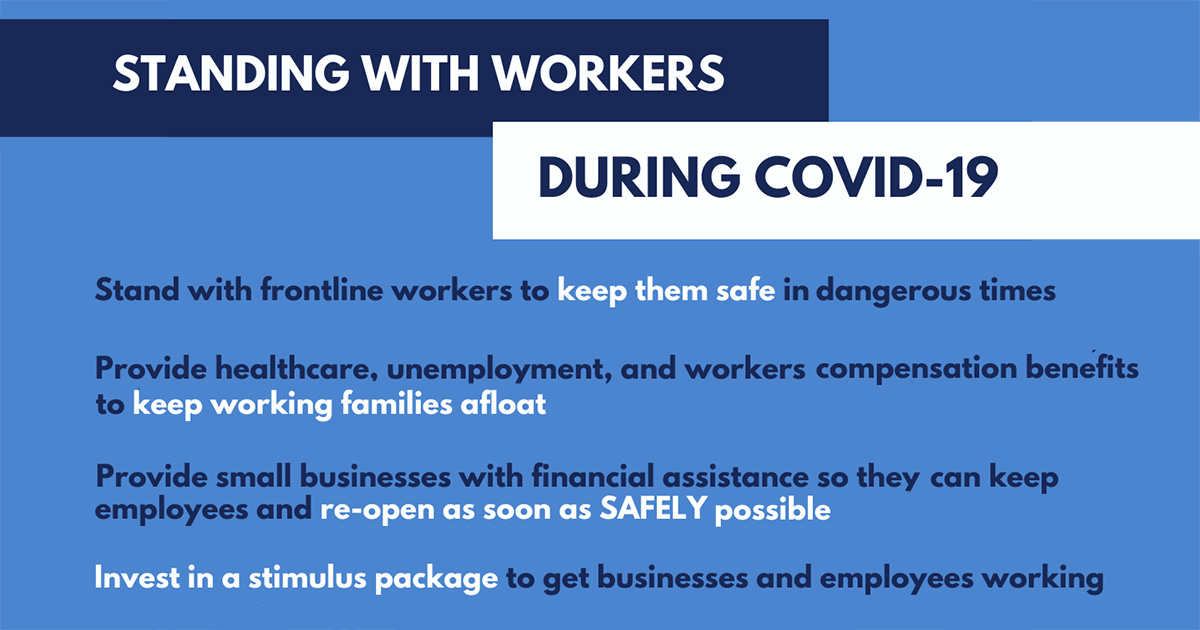
by Christin Brown | April 8, 2020 | News Releases
Harrisburg, PA − April 8, 2020 − The Senate adjourned Tuesday afternoon after the House Republicans indicated they would not be taking up Senate Bill 841, legislation that would have enabled local municipalities to hold their meetings remotely, permitted e-notary use; lengthened the time period a property tax payer can receive an early payment discount and delay penalties for late payments to Dec. 31st; and allowed businesses to make delayed payments on EITC. Another important amendment offered by Senator Pam Iovino (D-Allegheny) allowed school districts to renegotiate contracts to ensure contracted school workers can get paid and continue to receive benefits.
The amended SB 841 passed the Senate with bipartisan support. While the Senate Democrats and Republicans chose to put partisan difference aside, the House Republicans were pushing to please special interests and big donors. Intending to use this crisis as leverage, Speaker Turzai and his caucus passed legislation to prematurely allow businesses to reopen during this public health crisis and create a partisan task force to interfere with the Governor’s disaster response, both of which unnecessarily risk lives and threaten to expend the emergency.
“While the Governor and Department of Health Secretary offer leadership on public safety in daily briefings and Democratic members of the PA House and Senate draft legislation to protect working people who are either out of work or employed on the front lines of essential businesses, Republicans are putting lives at risk and undermining the Governor and Secretary Levine’s best efforts to end this crisis,” said Senate Democratic Leader Jay Costa, Jr. “Instead of taking the advice of our Health Secretary, they are trying to slow down our response and hasten the re-opening of non-essential businesses against the guidance of every public health entity in the country.”
The House Republicans were seeking even more egregious measures to provide civil immunity to big businesses, upend school districts ability to pay their teachers, and leave our corrections department employees at serious threat of the Coronavirus. Perhaps worst of all, the language does nothing to protect frontline workers, provide assistance to those that are out of work, or to help small businesses weather this crisis.
In an amendment to Senate Bill 327, House Republicans designed a task force with partisan appointees to usurp the Governor’s ability to rapidly respond to this quickly-evolving crisis. Their bill would require the Secretary of Health to leave PEMA, take hours away from public health crisis planning and defend her work in front of a redundant, political body.
The Senate Democratic Caucus will not support these bills. Alternatively, this caucus will be supporting legislation on the following issues:
- The American Working Family Relief Action Plan for front-line worker protections (Collett/L. Williams)
- Protecting workers during public health emergencies (Santarsiero)
- COVID-19 Food Worker Safety Act (Tartaglione)
- COVID-19 Grocery Store Worker Safety Act (Tartaglione)
- Payment of contract services in schools (Iovino)
- Childcare assistance (Schwank/L. Williams)
- Emergency expansion of the Family Medical Leave Act to provide paid sick leave (Farnese)
- Crisis grants for volunteer fire and EMS companies due to COVID-19 (Brewster)
- Require business interruption insurance to cover COVID-19 related business closures (Hughes)
- Eviction protection for all disaster emergencies (Farnese)
- Coronavirus disease and schools: allowing for online instruction (Dinniman)
- Creating a Common Wealth Fund to collect donations from individuals to provide for essential needs of those in need (AH Williams)
- Providing a presumption of eligibility for Workers’ Compensation benefits for workers that get sick in the workplace (Tartaglione)
- Ensuring receipt of a stimulus check from the Federal government is not included in an individual’s income for purposes of qualifying for social safety nets (Schwank)
- Exempting stimulus checks from the Federal government from State and local taxation (Brewster)
- Collaborating with financial institutions to mandate mortgage loan forgiveness, assistance to homeowners that were laid off due to state emergencies (Farnese)
“While many working Pennsylvanians are suffering from the COVID-19 pandemic, facing lost hours or even complete unemployment, others who find themselves in more fortunate circumstances have expressed a desire to help their fellow citizens by either donating to a local charity or patronizing local businesses,” said Senator Anthony H. Williams. “By establishing the “Pennsylvania Common Wealth” restricted account, taxpayers could redirect all or a portion of their stimulus check to the state, which in turn would be authorized to direct those funds into programs which help the neediest Pennsylvanians – property tax & rent rebates, temporary assistance for needy families, CHIP or medical assistance.”
“Pennsylvania needs solutions that help protect its working people who have been hit the hardest by the fallout of the coronavirus pandemic,” Senator Vincent Hughes said. “We in the Pennsylvania Senate Democratic Caucus have put forth a number of policy proposals that would do just that, meanwhile House Republicans have chosen to ignore these needs and push an agenda that jeopardizes public health and puts additional pressure on working people by delaying immediate relief. Our mission should be helping people in this unprecedented time of need and we will remain vigilant in protecting hardworking folks across the commonwealth.”
“As public servants, our most important duty is to protect the health, safety and welfare of our citizens. This includes making difficult decisions in challenging times. We all want businesses to reopen, employees back on the job, students back in classrooms and some semblance of normal life to resume, but that cannot happen unless we first continue mitigation efforts and follow the advice of our scientists and experts,” said Senator Wayne D. Fontana. “Anything contrary can set back progress and cause further harm on our economy and most importantly, on human health. The bipartisan legislation the Senate approved provides some necessary guidance and relief to local governments, businesses, school employees and property taxpayers during this unprecedented situation. It is unconscionable that House Republicans blatantly disregarded that duty and have chosen not to act.”
“The spread of coronavirus has not quieted the voice of special interests in Harrisburg and that’s tragic,” said Senator Larry Farnese. “Mitigation through isolation is working and we have to recognize that sacrifice through legislation that actually helps front-line workers instead of just saying nice things on social media.”
“This crisis and the Commonwealth’s response to the COVID-19 pandemic requires leadership, transparency and cooperation – not partisan politics,” said Senator John Blake. “While we’ve worked well with the Senate majority on real solutions that actually help people in this crisis, the House majority looks to undermine the executive authority of the Governor as well as the advice of medical and scientific experts regarding public health. I applaud the work being done by Governor Wolf and his administration to keep Pennsylvanians safe and to mitigate the spread of COVID-19. I will continue to support important legislation to help our business community, front-line workers and medical professionals; and to protect our citizens, schools and local governments across this state. We need to remain vigilant in following the recommendations of the PA Department of Health and the federal CDC.”
“Issues that the Commonwealth was already facing have been exacerbated by this pandemic, and child care services and early learning programs are near the top of the list. Childcare centers are teetering on the brink of insolvency, which is why part of our legislative package addresses early childhood learning and safe, quality childcare. We will not be able to restart Pennsylvania’s economy without this key component,” Senator Judy Schwank said. “Additionally, it’s vital that the income requirements of state programs like PACENET and Property Tax and Rent Rebate are adjusted so that Pennsylvanians receiving federal aid are not penalized later.”
“The key to an effective response to the pandemic is to ensure that our citizens are protected, health risks are addressed, and our economy restarts quickly,” Senator Jim Brewster said. “That’s why I introduced a six-point stimulus plan that will help small business, protect workers and create jobs once we are clear the threat posed by the pandemic. In addition, we need to make sure to address the immediate and long-term needs of first responders and all workers and businesses who are providing essential services during this time of extraordinary stress.”
“There is no segment of our Commonwealth that hasn’t been upended by this crisis. Everything is a priority. But in order to save livelihoods, we must first save lives,” said Senator Maria Collett. “As a nurse, I know firsthand the challenges our health care workers are up against and the urgency of passing legislation like the American Working Family Relief Action Plan for Front-Line Workers. Our doctors, nurses, first responders, senior care aides and others should not have to worry about getting sick or infecting others while performing their essential work.”
“It is irresponsible for the state to reopen businesses at the height of the COVID-19 outbreak. Those who are not essential workers should remain home,” said Senator Art Haywood. “We need to do all we can as legislators to support essential employees risking their lives on a daily basis,” said Senator Haywood (D-Montgomery/Philadelphia). “I will continue to support the work Governor Wolf and Secretary Levine have done to inform the public to remain safe and stay home.”
“The citizens of Pennsylvania are counting on their elected representatives to save lives by responding swiftly, pragmatically, and in a bipartisan manner to slow the spread of this highly contagious virus,” said Senator Pam Iovino. “To fulfill our duty to the public, we must follow the consensus guidance of public health professionals, focus on protecting front-line essential workers, and put in place protections that allow furloughed or unemployed workers and small businesses to weather the economic disruption.”
“As the Democratic chair of the Local Government Committee, I worked with stakeholders for weeks to craft the provisions of SB 841, I am disappointed these commonsense measures, which passed the Senate with bipartisan support, are being held up by House Republicans for little reason,” said Senator Tim Kearney. “The House should immediately pass SB 841 and focus on bringing relief to Pennsylvanians, rather than sabotaging the Governor’s efforts to keep our families safe.”
“Yesterday, the majority party in both chambers failed to use their legislative power, where they can literally pass any bill they want to, and instead decided to pack up and go home without,” said Senator Katie Muth. “Failing to pass meaningful bills when people are fighting for their lives is simply negligent.”
“Now is not the time to play politics,” said Senator Steve Santarsiero. “Saving lives has to be the first priority. In order to do that, we must all do our part and follow the Governor’s and Department of Health’s plans as they’ve been explained to us countless times. SB 841 is just one of many ways our caucus has worked in a bipartisan effort to provide relief to those who need it most. However, SB 327 is exactly what our healthcare professionals warn us against. Promoting a premature return to normalcy will only undermine our effort to keep the public safe, and further endanger thousands of lives.”
“Government’s most important role is the protection of its people. Since the COVID-19 crisis the Senate has met three times, with little to show for it. Communities across the commonwealth have no interest in the paralysis of government especially in the most desperate of times. What they do care about is the protection of our essential workforce, the interruption of our small businesses, job loss, staying in their homes and educating their children. The only thing that matters is the preservation and protection of every resource needed to keep families safe during this health crisis,” said Senator Sharif Street.
“We need to be back in Harrisburg, we need to get back to work. We must work together to ensure our communities are protected during uncertain times.”
“As thousands of Pennsylvanians continue to get sick and hundreds die, now is no time to play partisan politics,” Senator Tina Tartaglione said. “As public leaders, we must unite behind the common goal of reducing the threat of this virus and mitigating the harm being done to our constituents. The package of bills we have proposed will directly help all Pennsylvania families, including essential workers, displaced workers, first responders, school children, those who have become sick, and those in need. I urge all legislators from all political parties to support these bills.”
“Stopping the spread of COVID-19 and saving lives is our top priority. We also need to protect and support our constituents, our communities, and our businesses,” said Senator Lindsey Williams. “Our front-line essential workers – our hospital workers, grocery store workers, emergency service personnel and others – cannot afford to wait for PPE. They needed it weeks ago. Our childcare facilities need our help to stay open and provide care to the children of our essential workers while they risk their lives for us. Our small businesses need financial support to stay afloat. Our municipalities need the ability to meet remotely and make decisions that will ensure the safety of all of residents. There are a lot of needs right now and our constituents do not have time for us to waste playing partisan games or naming bridges. The Senate Democrats have offered concrete solutions that will help people. We should all be working together to get them to the Governor’s desk for signature as soon as possible.”
More information on the work of the Pennsylvania Senate Democratic Caucus during the COVID-19 crisis can be found at pasenate.com/covid19.
###

by Christin Brown | August 27, 2019 | News Releases
HARRISBURG, August 27, 2019 – After a months-long review of a sexual misconduct complaint against a former Pennsylvania House member, a Dauphin County grand jury has called for the Pennsylvania Legislature to create a new, independent Office of Legislative Responsibility to create a centralized reporting system for victims to report sexual harassment and sexual misconduct.
Among other things, the grand jury recommended the new independent office be led by a qualified investigator, have subpoena power in consultation with the district attorney in the relevant jurisdiction and have authority to investigate any alleged misconduct, not limited to sexual harassment or assault.
Members of the Pennsylvania Senate Democratic Caucus have welcomed this idea and plan to move forward when the legislature returns in September.
“Women in the capitol deserve to be safe, to feel safe, to be heard, and to be respected,” said Sen. Larry Farnese (D-1). “We must act swiftly and stand together to enact these policy changes to create a better working environment for everyone in the Capitol.”
“To protect the safety of all individuals in and around the Capitol, as well as those who interact with the General Assembly anywhere throughout the Commonwealth, we must empower and encourage victims to report alleged incidents of harassment and misconduct as soon as possible,” said Sen. Christine Tartaglione (D-2). “By creating an office dedicated to investigating these incidents independently, we will be sending a powerful message that the Pennsylvania Legislature takes all allegations seriously and that every voice will be heard.”
“This process has revealed the deficiencies in policy and reporting that has failed to keep women safe in and around the Capitol for years,” said Sen. Judy Schwank (D-11). “It is time that we take this conduct seriously and create a reporting process that affords victims the opportunity to come forward in safety and with dignity. It is time for today’s legislative leaders to lead the way in creating a path forward to ensure that the workplace is a safe place for all.”
“The findings of the Grand Jury Report reiterate what we already know and what the #MeToo Movement has made clear for years: there can be no tolerance for workplace harassment. Period,” said Sen. Maria Collett (D-12). “Our General Assembly needs to hold itself to the highest standards and lead by example by implementing and improving the procedures in which we address all claims of workplace harassment by adopting these recommendations. I look forward to working with my colleagues in the legislature as we take up this issue when we return to session.”
“Having an independent office as a central reporting and investigation unit makes some sense,” said Sen. Lisa Boscola (D-18). “It will help ensure consistency and efficiency in all caucuses and both Chambers.”
“As a career public servant, I believe that members of the General Assembly should be held to the highest standards of ethics and behavior to uphold the public trust,” said Sen. Pam Iovino (D-37). “The establishment of the Office of Legislative Responsibility will serve to ensure that public trust. An independent office will secure credible due process for all victims, regardless of gender, as well as all accused.”
“Our current system of reporting and investigating claims of workplace harassment is woefully inadequate and, in many cases, damaging to the very people it is designed to serve,” said Sen. Lindsey Williams (D-38). “We need to take this opportunity to implement the Grand Jury’s recommendations and create a system that ensures all victims and witnesses alike are protected from retaliation and encouraged to report instances of workplace harassment.”
“The recommendations of not pursuing criminal charges in this incident is a direct example of how the “justice” system and old boys club enable rape culture and abuse of power in our government,” said Sen. Katie Muth (D-44). “How many more of us have to be harassed, bullied, assaulted, and raped before real accountability is enforced? The recommendations made by the grand jury should’ve been mandated decades ago. Until there is true, unbiased, outside oversight of the members of the General Assembly, the current system of internal regulation and self-policing will continue to cause more harm, corruption, and wasted taxpayer dollars on salaries for predators and those that enable them.”
###
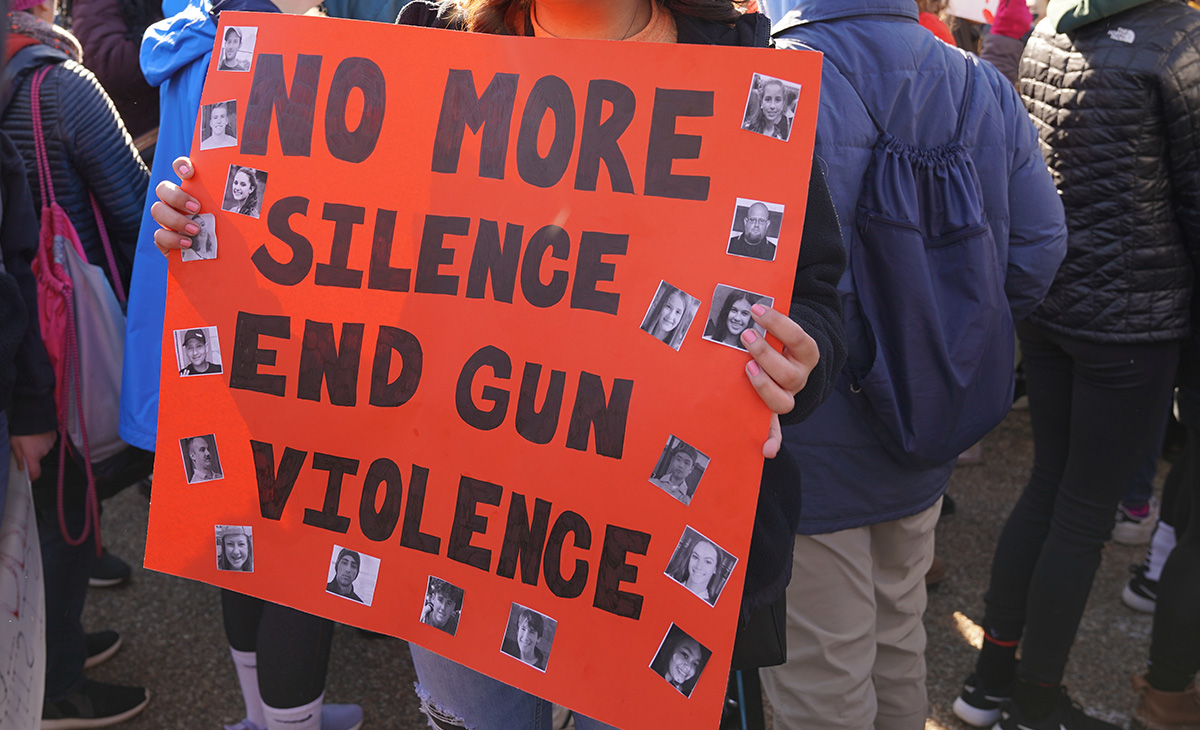
by Christin Brown | June 24, 2019 | News Releases
Harrisburg, Pa. − June 24, 2019 − Members of the Pennsylvania Senate Democratic Caucus today jointly sent a letter to Governor Tom Wolf requesting a disaster declaration for gun violence in the Commonwealth.
“We believe it is necessary to raise the public’s awareness of the massive loss of human life and the suffering inflicted on affected family, friends and neighbors where this tragedy is unfolding daily,” they wrote. “Just as you have signed six disaster declarations to provide every tool at the Commonwealth’s disposal to combat the opioid epidemic, the death toll and impact from illegal guns should merit immediate and coordinated attention.”
Specifically, a disaster declaration could do the following:
- Establish a task force led by the Department of Health to create and implement a public health framework for addressing gun violence
- Establish a command center in the Pennsylvania Emergency Management Agency to coordinate state and local law enforcement response
- Enhance the Joint-Local State Firearm Taskforce through additional personnel and funding to take illegal guns off the street
- Expand information gathering and sharing between all levels of law enforcement and community groups
- Increase law enforcement presence, both local and state, in targeted areas where gun violence is most prevalent
- Expedite and expand grants and other funding sources for community groups and nonprofit associations with a proven record of violence reduction and prevention
- Provide additional state resources for behavioral and mental health
- Bringing to bear the significant wealth of knowledge and experience in the Departments of Health and Human Services to provide de-escalation and de-confliction training throughout the community
- Require the Pennsylvania Department of Education provide training and professional development on trauma-informed education
View full letter →
###

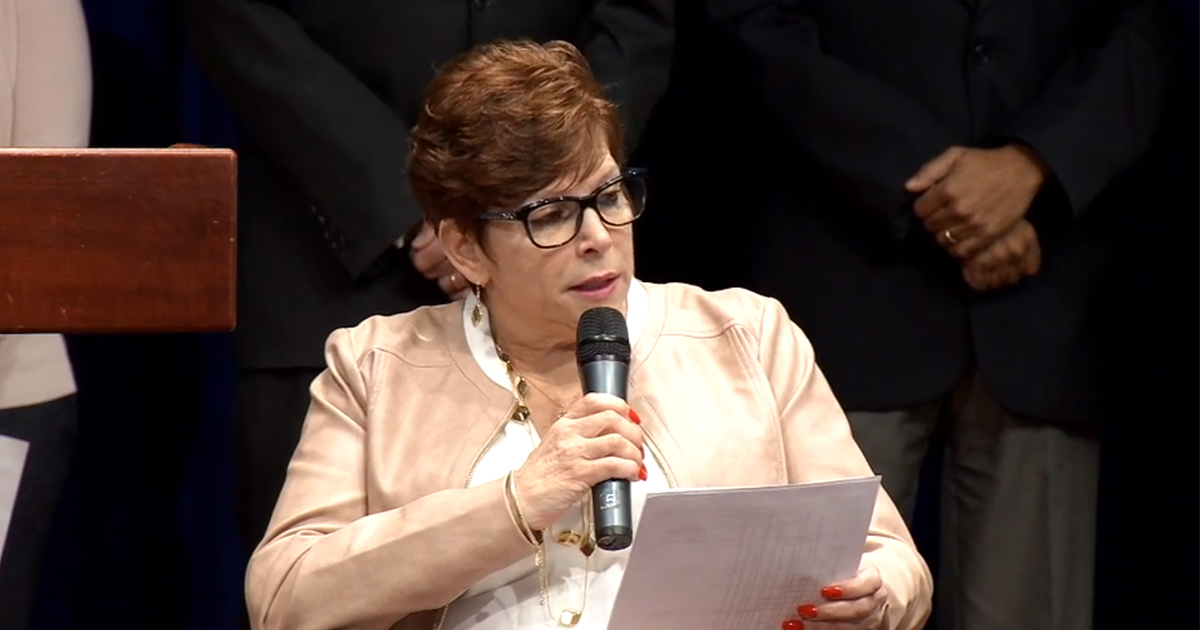
by Christin Brown | March 26, 2019 | News Releases
HARRISBURG, PA, March 26, 2019 – Democrats from the Pennsylvania House and Senate today introduced a package of legislation aimed to curb harassment in the workplace, along with support from Governor Tom Wolf and Victim’s Advocate Jennifer Storm.
“As a caucus, we’ve worked with stakeholders and advocates and our own employees to craft a package of legislation that we believe can curb sexual harassment and do more to protect its victims,” said Senate Democratic Leader Jay Costa, Jr. “Each of our bills in this package is aimed at expanding protections to individuals regardless of the size or type of their employment, because time is up on workplace harassment.”
“Workplace sexual harassment and discrimination didn’t begin overnight, and so it will take some time to properly correct,” Gov. Wolf said. “It’s not as easy as putting a few big-name figures in jail. We need to identify the everyday behaviors and correct them if we want Pennsylvania to be a great place to live and work. People can’t do their best work when they feel uncomfortable. You deserve to be treated in a way that meets basic standards that represent how we want all workers in Pennsylvania to act, and you should be treated with the respect and dignity that all workers in Pennsylvania deserve. That’s why I’m advocating for legislation to prevent workplace sexual harassment and discrimination in both the public and private sectors.”
The bills will be introduced in identical form in each chamber. They do the following:
- Cover contractors and unpaid interns under the protections of the Human Relations Act
- Amend the Human Relations Act to require employers to provide training to employees and to require standardized fair practice postings to specifically include examples of harassment and discrimination
- Require sexual harassment training for lobbyists
- Extend the Human Relations Act to include domestic workers
- Provide right to jury trial, punitive damages and an extended statute of limitations under the Whistleblower Bill
- Expand the Human Relations Act to include coverage from four employees to one employee, add the right to a jury trial, punitive damages, attorney fees and extend the statute of limitations
- Require employers to adopt written workplace harassment policies and reporting procedures
- Add sexual orientation and gender expression or identity to the list of classifications protected under the Pa. Human Relations Act
“For years, workplace harassment has been a pervasive issue in career fields across Pennsylvania and this nation. We need to harness the momentum and strength of the #MeToo movement and reverse years of discrimination in the workplace,” said Senator Larry Farnese. “No one, regardless of gender, race, or sexual orientation, should be pressured by, or suffer from, the weight of workplace harassment.”
“We need to make it clear that there is no place for any form of harassment and there will be no tolerance for it either,” said Senator Wayne D. Fontana. “With this legislative package, we are taking definitive steps that both send a strong message and back it up with substantive changes to how harassment can be prevented, how it should be handled and how victims should be treated.”
“Protecting whistleblowers on workplace harassment and discrimination is a small part of the solution to change our culture.” said Senator Haywood. “I am introducing this legislation again knowing that we have a long way to go.”
“In today’s business climate, when employers often turn to independent contractors and unpaid interns to fulfill their staffing needs, Pennsylvania law must account for and protect all worker classifications. Everyone is entitled to a workplace that is free of harassment and discrimination,” Senator Tartaglione said.
For more information, visit PaSenate.com/harassment
###

















